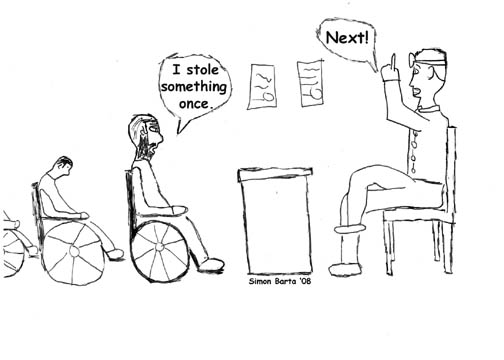After the Los Angeles Times revealed that Dr. Ronald Busuttil, executive chairman of UCLA’s surgery department, performed liver transplants on four Japanese gang leaders, a public questioning of who is truly worthy of organ donations surfaced in So Cal.
Some of those who disagree with UCLA’s decision to perform the operations are concerned that their organs could help out criminals.
A question we all must ask when thinking about this issue is: do we want health care professionals making decisions about our health based on whether or not they feel we are “good” or “bad” people?
According to the United Network for Organ Sharing website, they allocate organs as objectively as possible. Patients seeking organs are placed in a national “pool,” prioritized primarily by need of an organ.
Once a patient is chosen by UNOS, a panel of hospital staff from where the patient resides will decide whether or not the patient is physically ready for surgery.
Although the hospital’s staff makes most decisions based on objective medical judgments, there are also certain “non-medical” assessments like patient behavior that the panel of physicians, nurses, social workers and other workers take into consideration.
If the panel feels that a person’s personal behavior or habits will result in the failure of the organ, or he or she will not adhere to post-operative guidelines, the patient will not be a top candidate for receiving the organ. These assessments are looked at as objectively as possible, however, and are only in place to ensure that the organs will not be wasted on an unsuccessful recovery.
If these panels were to consider adding a person’s character to this fairly objective process, as some are now considering, the entire donation system would stop trying to help humanity and start trying to play judge, jury and executioner.
As the modern Hippocratic Oath puts it, observing a person’s character is God’s job. The role of health care professionals, on the other hand, is to help those who are in need of medical assistance, regardless of society’s disapproval of the behavior.
Furthermore, criminality and all around “badness” is too subjective a criterion for any single panel to decide on.
What some consider “bad” behavior others may consider nothing more than misguided. Who’s to say the alcoholic with a clean record is any better a candidate for a liver than the car thief who works out everyday?
It is understandable, though, that those who sign the donor form at the DMV might have some apprehensions about potentially giving their organs to criminals. Extending the life of someone who has hurt others like these four gang bosses have is not a reassuring thought, especially when it comes at the cost of another’s life.
If we start looking at who we will help out rather than what good it does to donate, our donor system will slowly collapse.
We would start getting situations where vegans would remove their donor stickers because a carnevor would receive a part of their body, and Republicans would do so because Democrats would benefit.
Obviously, when this happens noone gets organs and socially “good” people are denied as well.
Had UCLA denied these patients care because they were criminals, the medical center would have betrayed its duty to help all of those who need help, thereby destroying the fabric of the donor system. Sure, questioning the moral implications of what UCLA did to help these criminals is reasonable.
If we don’t question the ethical and moral nature of our systems, we will never progress.
How UCLA handled this touchy issue was undoubtedly the correct way. By helping these less-than-decent people, they showed their commitment to the Hippocratic Oath and maintained their objectivity in deciding who gets organs.
In a sense, these surgeries are really a victory we can all celebrate, not for helping out criminals, but for the objectivity of this system.





Dear Dr. Demara, thank you for clarifying this issue. These operations were surely a disgrace. Makes me sick.
As a physician with over 30 years experiencek, I can same the issue was “undoubtedly” handled in a highly inappropriate way by UCLA and Dr Busitill.
The Hypocratic Oath does not , in any way, require a physican to provide care for any one. He chooses his own patients. The only exception is when there is a contractual obligation, such a being on-call for an ER, having an established Dr-patient relationship, etc. The idea that doctors don’t make judgement calls is absurd. While it is not “bad guy-good guy”, it is the more important judgement- “can you pay my fee or not”?
The fact that the thugs flew here from Japan, and Japan has a large, very well developed liver transplant program, is a clear indication this was not a medical emergency. The Japanese were smart enough to apply some value standards, and decided this guy didn’t warrant use of this very scarce resource. Good for them-maybe some young father of three got the liver. Bad for us-maybe a young, father of three, died because of the UCLA decision. I can guarantee you the only issue was money. Non-contracted -rate transplants are very rare, and extremely profitable. UCLA (and the surgeon) made out like a yakuza. And exactly why did Doctor Busitill need to visit his patient in Japan. Do you think a kid from Hermosillo who came to UCLA for a special procedure would have a follow-up visit from the American doctor-in Hermosillo?
This was a disgrace.